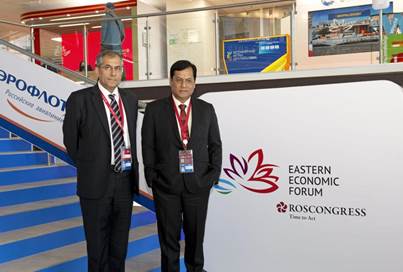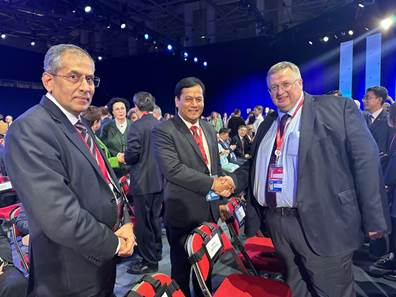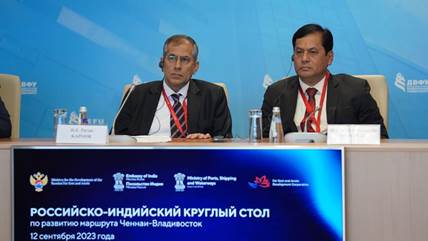The Union Minister of Ports, Shipping & Waterways and Ayush, Sarbananda Sonowal extends invitation for an Indo Russian Workshop on Eastern Maritime Corridor in Chennai
Indo Russian Workshop to provide a common meeting ground among the port authorities of Russian Far East and India, representatives of Russian railways, logistics/shipping companies of both countries
Coking Coal trade transport between India and Russia to start early operationalisation of EMC: Shri Sonowal
The Union Minister of Ports, Shipping & Waterways and Ayush, Shri Sarbananda Sonowal extended an invitation for an Indo Russian Workshop on Eastern Maritime Corridor (EMC) in Vladivostok, Russia today. Shri Sonowal was addressing at the session aimed at forging possibilities on early operationalisation of EMC as an alternative trade route between Russian port city of Vladivostok and Indian port city of Chennai. The workshop is proposed to take place from 30 October to 1st November, 2023 in Chennai, India.
Speaking on the occasion, the Minister, said, “The operationalisation of Eastern Maritime Corridor (EMC) will usher a new era of trade relationship between India and Russia. Under the visionary leadership of Prime Minister Shri Narendra Modi ji, India remains firmly committed towards making innovative solutions that will enhance and further foster the strong bilateral relationship between our two great nations. As our teams hedged their effort for an early operationalisation of EMC, the visit to Vladivostok, Vostochny, Nakhodka and Kozmino was particularly helpful. Taking this forward, I propose for a Workshop of all stakeholders at Chennai in India and extend our invitation to this workshop whe re we can meet, interact and discuss for smooth and swift operationalisation of EMC.”
re we can meet, interact and discuss for smooth and swift operationalisation of EMC.”
The Russian government also expressed their desire to visit the Chennai port with a large business delegation to explore opportunities and possibilities through bilateral discussion with their Indian business delegation. The Russian delegation was represented by Sergey Mochalnikov, Deputy Minister of Energy Minister, Russian Federation and Maxim Reshetnikov, Ministry of Economic Development of Russian Federation. The session was moderated by Denis Ilatovsky, Chairman of the Board of Directors of the Association of Commercial Seaports.
Speaking about India’s maritime programme and its flagship programme Sagarmala, the Minister said, “Under the visionary leadership of our Prime Minister Shri Narendra Modi ji, in 2015, our transformative Flagship Initiative of Sagarmala was launched with the objective to boost India’s logistics sector performance, by unlocking the full potential of India’s coastline and waterways. The vision of Sagarmala is to reduce logistics cost for both domestic and EXIM cargo with optimised infrastructure investment through port-led development. Currently, there are 802 projects worth investment of more than 65 Billion US Dollars for implementation under the Sagarmala Programme by 2035. Out of which, 228 projects worth 14.6 Billion US Dollars have been completed and 260 projects worth 27 Billion US Dollars are under implementation. Further, 314 projects worth 24 Billion US Dollars are under various stages of development. Further, under holistic development of coastal districts, a total of 567 projects with an estimated cost of around 7 Billion US Dollars have been identified. Our Prime Minister Shri Narendra Modi ji envisioned holistic infrastructure development to improve the productivity and employment opportunities through integrated approach by developing, railways, roadways, waterways and airways via Prime Minister Gati Shakti National Master Plan programme. The Gathishakti plan has become the basis of India’ rejuvenation to manufacture world-class products using new-age technology and cutting-edge innovation.”
Valery Prokopchuk, Deputy Chairman of the Government of Primorye Region; Pavel Kalmychek, Department for Bipartite Cooperation Development, Ministry of Economic Development of the Russian Federation; Sergey Berezkin, CEO of Ruscon LLC also spoke at the session. Pavan Kapoor, India’s Ambassador to Russia; S. K. Mehta, Chairman, Deendayal Port Authority; Vladimir Panov, Rosatom Special Representative for the Arctic Development; Dmitry Prokhorenko, Director for Foreign Network Development, Russian Export Center JSC also attended the session. Both the parties also discussed about modern infrastructure in ports and ways and means to ensure cargo volume for the shipping industry. The Deputy Chairman of Chennai Port Authority, S Viswanathan delivered a presentation on the “Сapabilities of Indian ports and prospects for operationalisation of Chennai-Vladivostok corridor.”Elena Kazarina, Commercial Director of the Port, Vladivostok Commercial Sea Port also delivered a presentation on “Development of FESCO’s Deep Sea routes and further directions of transport and logistics relations between Russia and India.” Denis Ilatovsky, Chairman of the Board of Directors of the Association of Commercial Seaports, delivered the welcome address as well as closing remarks.
It may be recalled that a Memorandum of Intent on Development of Maritime Communications between the two Ports of Vladivostok and Chennai was exchanged in the presence of Prime Minister Narendra Modi and the President Putin during Eastern Economic Forum in Vladivostok in September 2019. Subsequently, an independent study found that coking coal as the most suitable commodity for trade between the two countries using EMC. In due course, more commodities like oil, LNG, fertilisers to be added to the list of commodities transported via EMC.
Eastern Maritime Corridor (EMC) is estimated to reduce the time required to transport cargo between Indian and Russian Ports of Far-East Region by up to 16 days, i.e., 24 days in comparison to over 40 days currently taken to transport goods from India to Far East Russia via Europe. Present trade route between Mumbai in India and St Petersburg in Russia covers a distance of 8,675 nautical miles which takes approximately 35 to 40 days. The Chennai-Vladivostok sea route (EMC) will be covering a distance of about 5,600 nautical miles. A large container ship which travels at the normal cruising speed of 20-25 knots (37-46 km/hour), will be able to cover this distance in approximately 10 to 12 days. This corridor holds immense potential to unlock new opportunities for trade and cooperation.
Shri Sonowal also highlighted the major takeaways from the recently concluded G20 summit in New Delhi, under India’s presidency. The inclusion of African Union (AU) into the G20 depicts ‘Sabka Saath, Sabka Vikas’ philosophy. India also successfully championed as the voice of the global south, while advocating for advancing climate action and sustainable development, promotion of digital transformation and innovation, strengthening global health and pandemic preparedness as well as enhancing multilateralism and cooperation. He said, “Our Prime Minister Shri Narendra Modi has also effectively communicated India’s message of “Vasudhaiva Kutumbakam” (One Earth, One Family, One Future), fostering a sense of global solidarity and cooperation. The G20 presidency under Narendra Modi has been a watershed moment in India’s global standing. It has demonstrated India’s ability to lead on global issues and shape the international agenda. The achievements of the Indian presidency will continue to inspire and guide the G20 in the years to come.”
Shri Sonowal is on a five day official visit to Russia. Tomorrow, he is scheduled to meet his Russian counterpart, Vitaly Saveliev, Minister for Transport of Russia, among other important bilateral engagements. India’s Port Minister is also slated to visit the Vladivostok port tomorrow.






